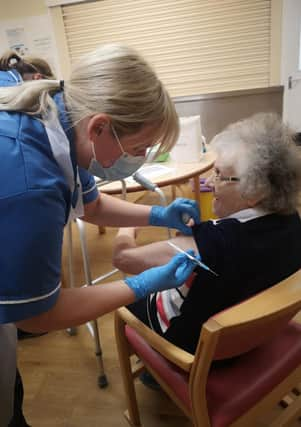50,000 Oxford/AstraZeneca vaccines available for Northern Ireland - with more to come


Health Minister Robin Swann confirmed that further supplies are expected early in the New Year.
The approval of the Oxford/AstraZeneca Covid-19 vaccine means Northern Ireland GPs can begin the first phase of population vaccination from January 4, starting with those aged 80 years and over, Minister Swann confirmed.
Advertisement
Hide AdAdvertisement
Hide AdApproval of the vaccine boosts our confidence that better times are ahead in 2021, Minister Swann stated.
The approval by the Medicines & Healthcare products Regulatory Agency (MHRA) paves the way for a significant acceleration of Northern Ireland’s vaccination programme.
But the Minister has also warned that the coming weeks will be among the most challenging yet in the pandemic, with our health service under immense pressure.
He said: “Today’s announcement is extremely welcome news and helps us look forward to the New Year with optimism and hope.
Advertisement
Hide AdAdvertisement
Hide Ad“The vaccine programme will transform the situation but that will take time. Between now and then, we need another big push to get through these next few months. We can all play our part in supporting the health service and in protecting each other from Covid-19. Please follow the public health advice to stop it spreading and please strictly abide by the current lockdown rules.”
The approval of the Oxford/AstraZeneca Covid-19 vaccine means Northern Ireland GPs can begin the first phase of population vaccination from 4 January, starting with those aged 80 years and over. The programme will then be rolled out based on age and other clinical vulnerability factors. Prioritisation will be guided by the Joint Committee on Vaccination and Immunisation (JCVI). The rate of progress will depend on the availability of the vaccine, in terms of both manufacture and supply.
The NI vaccination programme began on 8 December following approval for the Pfizer/BioNTech vaccine. Due to complicated handling constraints the initial phase of the vaccination programme was focused on care home residents and staff which were the number one priority as recommended by JCVI. In addition, health and social care staff in direct contact with vulnerable patients were also offered vaccination.
Progress to date includes: 80% of care homes visited, which has resulted in 8,940 care home residents vaccinated as well as 10,484 care home staff and 14,259 HSC staff now vaccinated. In total, over 33,000 individuals have now been vaccinated.
Advertisement
Hide AdAdvertisement
Hide AdChief Medical Officer Dr Michael McBride said: “To now have a second vaccine authorised in the UK a matter of weeks after the first is a credit to all who contributed. I commend our scientists and pharmaceutical company partners, the MHRA and, most importantly, every single person who contributed to the clinical trials, including those from Northern Ireland. This is a vaccine that we can take more readily to people. It will make the task of vaccinating those most at risk and then the entire population over 50 years much more achievable.”
Patricia Donnelly, Head of the Covid-19 vaccination Programme in Northern Ireland, said: “We have been working with our GPs and colleagues in primary care for some considerable time in anticipation of this day. The vaccination programme in Northern Ireland has already made an excellent start by focusing on the number one priority group as recommended by JCVI. The characteristics of this vaccine will ensure that we can now build on that progress and more rapidly scale up the vaccination programme roll-out, staying in line with the JCVI priority recommendations.”
Sinn Féin Councillor Sandra Duffy has welcomed the announcement that the Oxford-AstraZeneca COVID-19 vaccine has been authorised for widespread use.
Speaking after the announcement this morning the local Health spokesperson said
Advertisement
Hide AdAdvertisement
Hide Ad“I welcome this announcement that the Oxford-AstraZeneca vaccine will now begin to be rolled out. It is important those most at risk are prioritised from the outset of the vaccination programme.
“However, we must be clear that a full roll-out of vaccines could take months and we need to also see the implementation of an effective test, trace, isolate and support system that can fully meet the needs of people here. It is important that we all continue to practice social distancing, good hand hygiene and the appropriate use of PPE.”